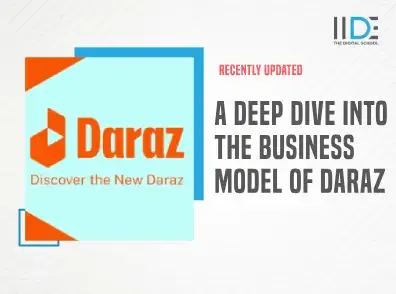
Updated on Dec 11, 2025
|4,279K+ views
The business model of Daraz is all about focusing on providing a hybrid marketplace, combining direct sales with third-party vendor offerings. With a strong logistics network and a wide range of products, Daraz has become a leading e-commerce platform. Its business model ensures diverse revenue streams, including commissions, delivery fees, and advertising services, fostering continuous growth.
Today, when ordering online is such a common thing, e-commerce is filled with multiple players, but there's one emerging company named Daraz.
The way they make money by connecting people who want to sell things with people who want to buy them. They have a system to deliver products, and they use online ads to get people to visit their website.
In 2018, Alibaba bought Daraz, which has helped it grow even more. Daraz is always trying new things and getting bigger, and it's a very important part of how people shop online in South Asia now.
Its way of doing business has been instrumental in its rapid growth and success. Like other successful brands that rely on a solid marketing strategy, it has built a platform that connects local and international businesses with millions of consumers.
Let's take a closer look at the business model of Daraz and how it has revolutionised the online shopping experience.


Learn Digital Marketing for FREE
- 45 Mins Masterclass
- Watch Anytime, Anywhere
- 1,00,000+ Students Enrolled


About Daraz

Daraz started its journey in 2012 and has quickly become one of South Asia’s leading e-commerce platforms, with a strong presence in countries like Nepal. Offering everything from electronics and fashion to groceries, Daraz has become a one-stop shop for consumers looking to browse and purchase a wide range of products online.
In 2018, Daraz joined the Alibaba Group, which gave the platform a big technological boost and helped expand its reach. This partnership allowed Daraz to tap into Alibaba's vast e-commerce expertise, further strengthening its South Asian position.
It stands out because of its unique business model, which covers e-commerce, logistics, payment systems, and even financial services. This holistic approach has helped the platform cater to over 500 million customers across the region.
In Nepal, Daraz has played a major role in transforming the e-commerce scene by connecting local brands with international ones and investing in the logistics and infrastructure needed to improve the overall shopping experience.
The platform is also dedicated to supporting local communities and empowering sellers throughout South Asia, making it a game-changer in the region.
What’s New with Daraz in Nepal
Operational Adjustments: In June 2024, Daraz reduced its Nepal workforce by 60%, transferring daily operations to the Bangladesh office. This move was taken to keep in line with Daraz's business model, which aimed to streamline operations amid market challenges.
Influencer Collaborations: Daraz also collaborated with well-known influencers such as Sanjay Koirala and Shree Krishna Shrestha in 2024. The influencers featured in digital campaigns showcased the latest deals and products on Daraz, expanding its reach among the younger Nepali audience and furthering the brand's digital transformation.
Want to understand digital marketing in depth? You can look forward to an MBA in digital marketing.
Buyers Persona:

Rajeev
Occupation: Financial Planner
Age: 36
Motivations:
- Convenience & time-saving
- Ease of shopping
- Value for money
Interests & Hobbies:
- Cricket
- Reading newspaper
- Travelling
Pain Points:
- High Shipping Costs
- Unkown seller
- Complex return procedure
Social Media Presence:
Business Model of Daraz
Daraz, recognised as one of the leading e-commerce platforms in South Asia, has become a household name in Nepal. The business model of Daraz focuses on providing a seamless online shopping experience for customers.
This is done by offering a wide range of products and facilitating smooth transactions. Let's break down the core components of this business model.
1. Market and Share Analysis of Daraz
Daraz has firmly established itself as a dominant player in Nepal's e-commerce sector. Through its business model of Daraz, the platform has gained substantial traction among Nepali consumers.
As of February 2025, Daraz’s Nepal website, daraz.com.np, ranks 25,735 globally and 25th within Nepal, indicating its significant presence in the local market.
Market Position
When we look at the Daraz business model, it becomes clear why the company is a leader in Nepal’s e-commerce space. In 2018, Daraz estimated the e-commerce market in Nepal to be worth $25 million, and at the time, the company was experiencing an impressive 300% annual growth rate.
This growth trajectory has not only solidified Daraz’s position as a market leader but has also allowed it to surpass key competitors such as HamroBazar, SastoDeal, and Thulo.
Revenue Performance
The Daraz business model has shown remarkable financial growth over the years. Daraz is on track to reach $100 million in annual sales, a milestone that highlights the platform’s success.
The company’s 11.11 sales event in 2021 generated approximately Rs. 360 million, which marked a 100% year-on-year growth. This performance underscores the robust revenue model that Daraz has built through effective marketing strategies and strong consumer engagement.
User Engagement
One of the most impressive aspects of the business model of Daraz is its ability to drive high levels of user engagement. In February 2025, Daraz recorded 1.6 million visits, with users spending an average of 4 minutes and 24 seconds per visit, browsing approximately 6.66 pages per session.
A large portion of this traffic (86.43%) comes from Nepal, with additional visitors from countries like the United States, India, Australia, and Pakistan. This high level of user engagement is a testament to the brand’s ability to provide a seamless and engaging shopping experience.
2. Product Offerings

The business model of Daraz revolves around offering an array of products tailored to meet the diverse needs of its consumers. From electronics, home appliances, and groceries to fashion and beauty products, Daraz offers something for everyone.
This wide selection allows Daraz to make an entry into multiple market segments. This helps them reach a broader audience. By focusing on both local and international products, Daraz provides Nepali consumers access to a wide range of choices.
3. Target Audience
The Daraz business model is designed to cater to a wide target audience. Its customers range from young tech-savvy individuals to families looking for everyday goods.
In Nepal, Daraz appeals to those who are looking for convenience, feasibility, and a wide selection of products. The platform has gained popularity amongst urban dwellers but is gradually gaining traction in smaller towns and rural areas as internet penetration and digital literacy increase.
4. Funding & Investors
The business model of Daraz has attracted significant investments over the years, allowing the company to scale its operations across multiple countries, including Nepal.
Daraz was acquired by Alibaba Group in 2018, which significantly boosted its financial resources and technological infrastructure. This acquisition has allowed Daraz to leverage Alibaba's expertise in logistics and digital technologies, further strengthening its market position.
5. Revenue Model
The Daraz revenue model is built on multiple streams to maximize profitability. The platform generates income through commissions from sellers, delivery charges, and advertising fees.
By connecting buyers and sellers, Daraz acts as a marketplace, charging a commission on every sale made through the platform. Additionally, Daraz generates revenue by offering premium services such as fast shipping and promotional ads.
This diversified revenue model has helped Daraz maintain a steady income stream while expanding its offerings in the Nepali market.
6. Digital Marketing Strategies
A key element of the business model of Daraz is its robust digital marketing strategies. Daraz invests heavily in online advertising, including social media campaigns, influencer marketing, and search engine optimization (SEO).
The platform also uses data-driven marketing techniques to target specific customer segments, ensuring personalized shopping experiences.
By utilising popular social media channels and partnering with local influencers, Daraz builds a strong brand presence in Nepal, making it the go-to platform for online shopping.
Here are a couple of strategies that Daraz employs to engage its audience:
1. Discount Campaigns
Daraz frequently runs promotional campaigns such as buy-one-get-one-free (BOGO) and percentage-off deals to attract customers. These strategies not only enhance competitiveness but also drive sales and increase brand visibility.
2. Digital Advertising
Daraz utilizes a mix of digital advertising channels to create awareness and capture consumer interest. This includes YouTube bumper ads, display and search ads, and dynamic remarketing. Such targeted advertising ensures that promotions reach the appropriate audience segments effectively.
To learn effective ways of online advertising, we highly recommend choosing a digital marketing course in Nepal.
7. Value Proposition
Daraz's value proposition is built on convenience, variety, and affordability. For consumers in Nepal, Daraz makes shopping easy by offering a huge range of products, from electronics to clothing and groceries, all delivered right to their doorsteps.
What's even better is the range of discounts and promotions they offer, making shopping even more accessible. Daraz also brings a blend of local and international products under one roof, becoming the go-to platform for all kinds of shopping needs across Nepal.
8. Operational Model
The business model of Daraz relies on a hybrid marketplace that combines both direct sales and a platform for third-party sellers. This model helps Daraz keep things scalable without stockpiling massive amounts of inventory.
Instead, it connects sellers directly to consumers, letting them handle fulfillment. To ensure a smooth experience for Nepali shoppers, Daraz has heavily invested in its logistics network, making sure orders are delivered on time, even to the more remote areas.
They make sure everything runs smoothly with local partnerships for deliveries and their own logistics system.
9. Strategic Alliances & Partnerships
A big part of the Daraz business model is the partnerships that help it grow. Daraz has teamed up with a wide range of local vendors, big global brands, and logistics companies to expand its product offering.
But what really boosted Daraz was its acquisition by Alibaba Group. This alliance allowed Daraz to tap into Alibaba's world-class infrastructure, payment systems, and global networks, making it even easier for Nepali consumers to shop locally and internationally.
These partnerships help Daraz offer a wider selection of products, make their operations more efficient, and bring new services to the Nepali market.
10. Technological Innovations
Technology plays a big role in designing or restructuring Daraz's business model, making it easier for customers and sellers.
Daraz is constantly investing in tech like AI and machine learning to improve the shopping experience, whether that's personalising product recommendations, streamlining their supply chain, or predicting trends.
Their app and website are user-friendly and secure, with easy navigation, quick payment options, and real-time tracking, ensuring a smooth shopping experience every time.
11. Corporate Social Responsibility (CSR)
Beyond business, Daraz also focuses on making a positive social impact. Their business model includes several Corporate Social Responsibility (CSR) initiatives. These initiatives aim to give back to the community.
It runs programs in education, sustainability, and supporting local businesses. Through its "Daraz for Good" initiative, the platform empowers women entrepreneurs in Nepal by allowing them to sell their products on Daraz.
On top of that, they’re working on reducing their environmental footprint through sustainable packaging and eco-friendly logistics solutions.
You can also read the business model of Flipkart, similar to Daraz, relies on a marketplace platform connecting sellers and buyers, generating revenue through commissions and other services.
Top Competitors
Here are the top 5 competitors of Daraz in Nepal:
- HamroBazar: A popular local e-commerce platform, HamroBazar competes with Daraz through its wide product offerings, from electronics to fashion, with a focus on meeting the needs of its local consumers.
- SastoDeal: One of the biggest e-commerce platforms in Nepal, SastoDeal offers similar product categories and focuses on providing competitive prices and convenient payment options to Nepali consumers.
- Thulo.com: A growing competitor, Thulo.com offers an array of products that include electronics, fashion, and home goods, positioning itself as a reliable alternative to Daraz in the Nepali market.
- OkDam: OkDam competes directly with Daraz by focusing on offering electronics and gadgets. It has become popular for its competitive pricing strategy and timely delivery in Nepal.
- MeroShopping: MeroShopping is another significant player in Nepal’s e-commerce space. Its diverse product offerings include electronics, home appliances, and fashion, with a focus on delivering products with customer satisfaction in mind.
Want to Know Why 2,50,000+ Students Trust Us?
Dive into the numbers that make us the #1 choice for career success


Online
Best For
AI Enthusiasts
Mode of Learning
Online
Duration
5 Months

Offline
Best For
12th Passouts
Mode of Learning
On Campus (Mumbai)
Duration
3 Years
Recent Post
Frequently Asked Questions
The business model of Daraz in Nepal is based on a hybrid marketplace approach. It combines direct sales by Daraz itself with a platform where third-party sellers can list their products. This model allows Daraz to offer a wide range of products without holding large inventories. The platform generates revenue through commissions on sales, delivery charges, and premium advertising services for sellers.
The most sold product on Daraz Nepal varies by category and season, but electronics, particularly mobile phones and accessories, often top the sales charts. Daraz ensures it offers a wide selection of electronics at competitive prices, making them highly popular among Nepali consumers. Fashion items, home appliances, and beauty products also consistently perform well.
The Daraz revenue model in Nepal primarily revolves around commissions from third-party sellers, delivery charges, and advertising fees from brands and sellers looking to promote their products on the platform. This diversified revenue stream helps Daraz maintain its profitability while continuing to expand in the competitive Nepali e-commerce market.
Yes, Daraz Nepal has expanded its delivery service to most regions of the country. Thanks to its strong logistics network and partnerships with local courier services, Daraz is able to offer delivery options even to remote areas of Nepal. This is a key component of Daraz's business model, ensuring that it can reach a wide consumer base across the nation.
Yes, one of the key features of the Daraz business model in Nepal is the option for cash on delivery (COD). This payment option has been highly favored by Nepali customers, as it allows them to pay for their products in cash when the products are delivered to their doorstep. This flexible payment option has contributed to Daraz's popularity and high customer satisfaction.
Customer satisfaction is central to the business model of Daraz. The company focuses on offering a seamless shopping experience with easy returns, responsive customer service, and timely deliveries. By integrating customer feedback and continually improving its platform, Daraz ensures that customers have a positive shopping experience, making it a trusted e-commerce platform in Nepal.
The Daraz business model in Nepal includes a return and refund policy, ensuring customer satisfaction. If a product is defective, damaged, or doesn't meet the buyer's expectations, customers can request a return within a specified time frame. Daraz processes refunds through various payment methods or as store credits, depending on the original payment method. This return policy helps build trust and keeps the shopping experience reliable and hassle-free for Nepali consumers.
Aditya Shastri leads the Business Development segment at IIDE and is a seasoned Content Marketing expert. With over a decade of experience, Aditya has trained more than 20,000 students and professionals in digital marketing, collaborating with prestigious institutions and corporations such as Jet Airways, Godrej Professionals, Pfizer, Mahindra Group, Publicis Worldwide, and many others. His ability to simplify complex marketing concepts, combined with his engaging teaching style, has earned him widespread admiration from students and professionals alike.
Aditya has spearheaded IIDE’s B2B growth, forging partnerships with over 40 higher education institutions across India to upskill students in digital marketing and business skills. As a visiting faculty member at top institutions like IIT Bhilai, Mithibai College, Amity University, and SRCC, he continues to influence the next generation of marketers.
Apart from his marketing expertise, Aditya is also a spiritual speaker, often traveling internationally to share insights on spirituality. His unique blend of digital marketing proficiency and spiritual wisdom makes him a highly respected figure in both fields.